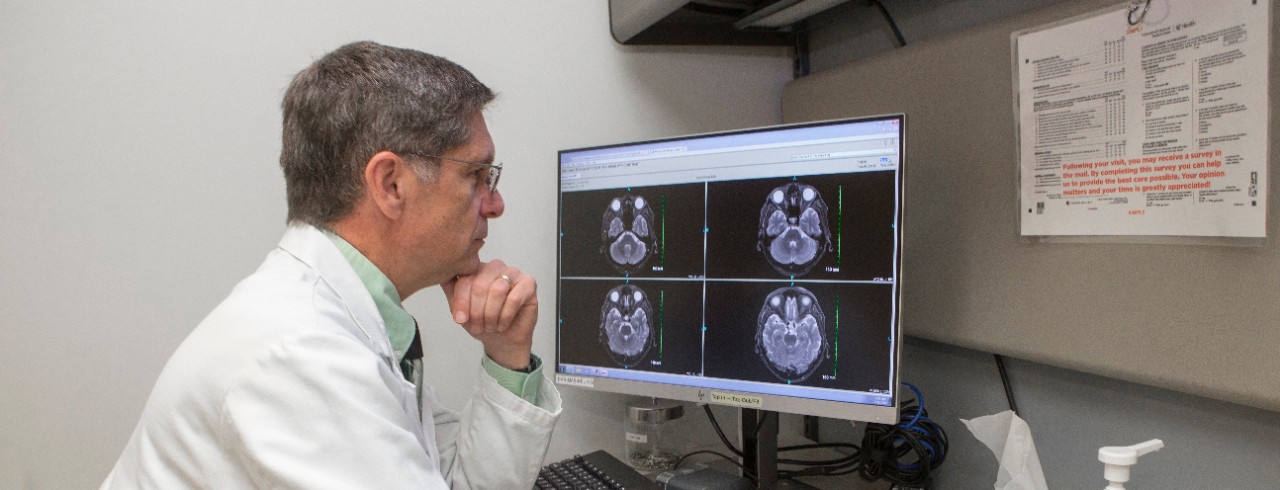
HealthDay: 'Neuroprotectant' drug could boost outcomes after stroke
UC's Broderick comments on study
A new study found using a "neuroprotectant" drug alongside the standard surgical removal of a blood clot may reduce the risk of death and disability following a stroke.
Researchers presenting data at the International Stroke Conference reported the medication, called ApTOLL, protects brain tissue from continuing damage by cooling down inflammation.
More than 150 people who had an ischemic stroke were enrolled in the study in France and Spain, either receiving ApTOLL at two different doses or a placebo medication in addition to mechanical blood clot removal.
The patients who received the higher dose of ApTOLL were four times less likely to die from stroke compared to the patients who received a placebo.
Joseph Broderick, MD, professor in UC’s Department of Neurology and Rehabilitation Medicine in the College of Medicine, director of the UC Gardner Neuroscience Institute and a UC Health physician, commented on the study for HealthDay. He said the drug needs to be tested more thoroughly before becoming a standard of care.
"The data warrants further study in a phase 3 study, but differences seen in this trial may be due to small number of patients and imbalances in factors related to outcome," Broderick said, adding that a much larger trial would be needed to confirm the findings.
Featured photo at top of Dr. Broderick. Photo/Joseph Fuqua II/University of Cincinnati
Related Stories
WLWT: UC hosts RESET epilepsy trial
May 3, 2023
WLWT spoke with the University of Cincinnati's Brandon Foreman about a clinical trial testing a new treatment for status epilepticus, the most severe and deadly form of epilepsy.
WVXU: UC study tests tongue exercises to improve swallowing function after stroke
January 11, 2024
WVXU highlighted a new trial at the University of Cincinnati that will test an at-home tongue endurance exercise to improve patients’ swallowing function after a stroke.
U.S. News: New form of levodopa might improve Parkinson's care
April 27, 2023
National outlets including U.S. News & World Report highlighted research presented by the University of Cincinnati's Alberto Espay on promising new treatments for Parkinson's disease.
National publications highlight UC stroke research
February 13, 2023
Several national news outlets highlighted the University of Cincinnati's Eva Mistry presenting on the results of the BEST-II trial at the International Stroke Conference.
HealthDay: 'Neuroprotectant' drug could boost outcomes after stroke
February 10, 2023
The University of Cincinnati's Joseph Broderick commented to HealthDay on the results of a new study finding a "neuroprotectant" drug alongside the standard surgical removal of a clot may lower the risk of death and disability following a stroke.
U.S. News: Scientists propose new mechanism driving Alzheimer's
October 6, 2022
U.S. News & World Report highlighted recent research from the University of Cincinnati that supports the hypothesis that Alzheimer’s disease is caused by a decline in levels of a protein called amyloid-beta.
Know Stroke Podcast: UC expert discusses past, present and future of stroke research
September 21, 2023
The University of Cincinnati's Joseph Broderick, MD, recently joined the Know Stroke Podcast to discuss the current state of stroke research, including the FASTEST trial he is leading to test a potential treatment for strokes caused by ruptured blood vessels in the brain.
Drugs.com: Lowering blood pressure after clot removal may not be safe
September 22, 2023
Drugs.com and HealthDay highlighted University of Cincinnati research recently published in JAMA that found using blood pressure medications to lower the top number of blood pressure readings (systolic blood pressure) may not be safe or effective among people who have an acute ischemic stroke and undergo a successful mechanical clot removal.
Study: Lowering blood pressure after clot removal may not be safe; should be individualized
February 10, 2023
The University of Cincinnati's Eva Mistry presented research that found using medications to lower systolic blood pressure immediately after mechanical clot removal for acute ischemic stroke may not be safe or effective at the International Stroke Conference 2023.
Clinical Research News: Action plan developed to enhance enrollment in acute stroke trials
November 15, 2023
Clinical Research News highlighted recommendations to improve recruitment in acute stroke trials, led by UC's Joseph Broderick, following the Stroke Treatment Academic Industry Roundtable XII earlier this year.
